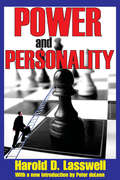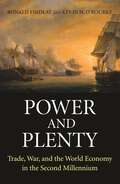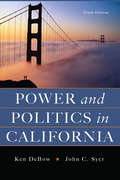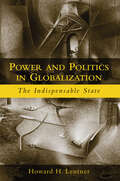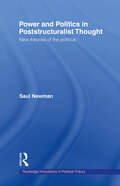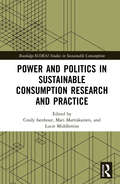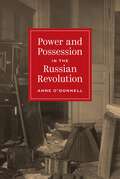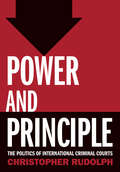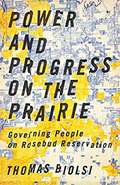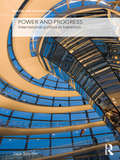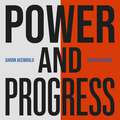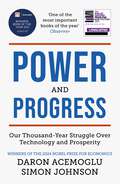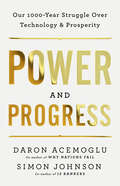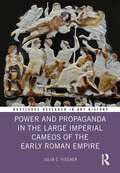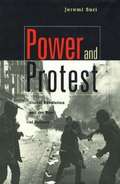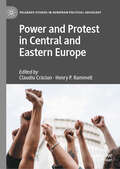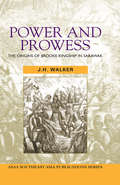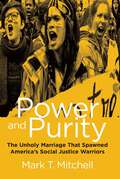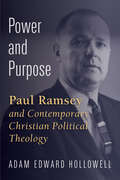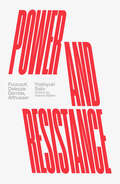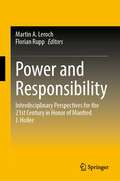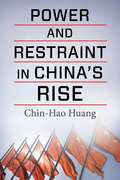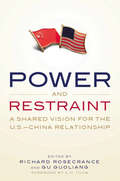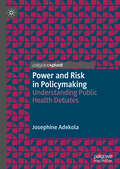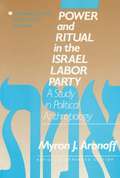- Table View
- List View
Power and Personality
by Harold D. LasswellThis book concerns the wanting, getting, and giving of power. Recent advances in medicine, sociology, and psychology have deepened our understanding of the motives, skills, and experience that operate between leaders and those who are led. Since power is about decision-making, it figures not only in offi cial institutions but in other organizations, including political parties, pressure groups, trade associations, business enterprises, trade unions, and many other types of organizations.A general theory of the political personality is set forth here. Lasswell describes the process by which power becomes a value of first importance and the way appropriate skills in exercising power are acquired. He shows that special political types such as agitators or administrators are related to basic types of character that contribute to how they lead. Finally, his analysis offers original perspectives to understand democratic leadership.Lasswell offers definite suggestions for perfecting self-observatories in national and world affairs and for forming democratic personalities, selecting and training democratic leaders, and reducing destructive conflicts in human relationships. Power and Personality followed the author's 1930 work Psychopathology and Politics, which was widely hailed for its pioneering approach. Power and Personality reevaluated the entire issue of the relationship between psychology and politics in the light of subsequent experience and scientific developments since publication of that earlier work. Lasswell's ideas continue to carry great weight and persuasiveness.
Power and Plenty: Trade, War, and the World Economy in the Second Millennium (The Princeton Economic History of the Western World #30)
by Ronald Findlay Kevin H. O'RourkeInternational trade has shaped the modern world, yet until now no single book has been available for both economists and general readers that traces the history of the international economy from its earliest beginnings to the present day. Power and Plenty fills this gap, providing the first full account of world trade and development over the course of the last millennium. Ronald Findlay and Kevin O'Rourke examine the successive waves of globalization and "deglobalization" that have occurred during the past thousand years, looking closely at the technological and political causes behind these long-term trends. They show how the expansion and contraction of the world economy has been directly tied to the two-way interplay of trade and geopolitics, and how war and peace have been critical determinants of international trade over the very long run. The story they tell is sweeping in scope, one that links the emergence of the Western economies with economic and political developments throughout Eurasia centuries ago. Drawing extensively upon empirical evidence and informing their systematic analysis with insights from contemporary economic theory, Findlay and O'Rourke demonstrate the close interrelationships of trade and warfare, the mutual interdependence of the world's different regions, and the crucial role these factors have played in explaining modern economic growth. Power and Plenty is a must-read for anyone seeking to understand the origins of today's international economy, the forces that continue to shape it, and the economic and political challenges confronting policymakers in the twenty-first century.
Power and Politics in California
by Ken Debow John C SyerNow in its ninth edition,Power and Politics in California continues its tradition of asking Californians to take a hard and systematic look at their state governance, and engage themselves in a critical analysis of what is working, what is not, and what changes need to be made for the state to meet the increasingly formidable challenges it faces.The era of Arnold is now in its mid-stages, and the rise of this very different political personality has had significant impacts on the state. This ninth edition provides analysis of Governor Schwarzenegger in context and looks forward to how California's fiscal condition, educational system, and response to diversity will play a vital role in shaping the state's politics in the future.
Power and Politics in Globalization: The Indispensable State
by Howard H. LentnerFirst published in 2004. Routledge is an imprint of Taylor & Francis, an informa company.
Power and Politics in Poststructuralist Thought: New Theories of the Political (Routledge Innovations in Political Theory #Vol. 17)
by Saul NewmanThis book explores the impact of poststructuralism on contemporary political theory by focussing on problems and issues central to politics today. Drawing on the theoretical concerns brought to light by the ‘poststructuralist’ thinkers Foucault, Derrida, Lacan, Deleuze and Max Stirner, Newman provides a critical examination of new developments in contemporary political theory: post-Marxism, discourse analysis, new theories of ideology and power, hegemony, radical democracy and psychoanalytic theory. He re-examines the political in light of these developments in theory to suggest new ways of thinking about politics through a reflection on the challenges that confront it. This volume will be of great interest to students of postmodernism and poststructuralist theory in political science, philosophy, sociology, philosophy and cultural studies.
Power and Politics in Sustainable Consumption Research and Practice (Routledge-SCORAI Studies in Sustainable Consumption)
by Cindy Isenhour Lucie Middlemiss Mari MartiskainenWith growing awareness of environmental deterioration, atmospheric pollution and resource depletion, the last several decades have brought increased attention and scrutiny to global consumption levels. However, there are significant and well documented limitations associated with current efforts to encourage more sustainable consumption patterns, ranging from informational and time constraints to the highly individualizing effect of market-based participation. This volume, featuring essays solicited from experts engaged in sustainable consumption research from around the world, presents empirical and theoretical illustrations of the various means through which politics and power influence (un)sustainable consumption practices, policies and perspectives. With chapters on compelling topics including collective action, behaviour-change and the transition movement, the authors discuss why current efforts have largely failed to meet environmental targets and explore promising directions for research, policy and practice. Featuring contributions that will help the reader open up politics and power in ways that are accessible and productive and bridge the gaps with current approaches to sustainable consumption, this book will be of great interest to students and scholars of sustainable consumption and the politics of sustainability.
Power and Possession in the Russian Revolution (Histories Of Economic Life Ser. #27)
by Professor Anne O'DonnellA history that reframes the Bolsheviks&’ unprecedented attempts to abolish private property after the revolutions of 1917 The revolutions of 1917 swept away not only Russia&’s governing authority but also the property order on which it stood. The upheaval sparked waves of dispossession that rapidly moved beyond the seizure of factories and farms from industrialists and landowners, envisioned by Bolshevik revolutionaries, to penetrate the bedrock of social life: the spaces where people lived. In Power and Possession in the Russian Revolution, Anne O&’Donnell reimagines the Bolsheviks&’ unprecedented effort to eradicate private property and to create a new political economy—socialism—to replace it.O&’Donnell&’s account captures the story of property in reverse, showing how the bonds connecting people to their things were broken and how new ways of knowing things, valuing them, and possessing them coalesced amid the political ferment and economic disarray of the Revolution. O&’Donnell reminds us that Russia&’s postrevolutionary confiscation of property, like many other episodes of mass dispossession in the twentieth century, largely escaped traditional forms of record keeping. She repairs this omission, drawing on sources that chronicle the lived experience of upheaval—popular petitions, apartment inspections, internal audits of revolutionary institutions, and records of the political police—to reconstruct an archive of dispossession. The result is an unusually intimate history of the Bolsheviks&’ attempts to conquer people and things.The Bolsheviks&’ reimagining of property not only changed peoples&’ lives and destinies, it formed the foundation of a new type of state—one that eschewed the defense of private property rights in favor of an enduring but enigmatic new domain: socialist state property.
Power and Principle: The Politics of International Criminal Courts
by Christopher RudolphOn August 21, 2013, chemical weapons were unleashed on the civilian population in Syria, killing another 1,400 people in a civil war that had already claimed the lives of more than 140,000. As is all too often the case, the innocent found themselves victims of a violent struggle for political power. Such events are why human rights activists have long pressed for institutions such as the International Criminal Court (ICC) to investigate and prosecute some of the world’s most severe crimes: genocide, war crimes, and crimes against humanity.While proponents extol the creation of the ICC as a transformative victory for principles of international humanitarian law, critics have often characterized it as either irrelevant or dangerous in a world dominated by power politics. Christopher Rudolph argues in Power and Principle that both perspectives are extreme. In contrast to prevailing scholarship, he shows how the interplay between power politics and international humanitarian law have shaped the institutional development of international criminal courts from Nuremberg to the ICC. Rudolph identifies the factors that drove the creation of international criminal courts, explains the politics behind their institutional design, and investigates the behavior of the ICC. Through the development and empirical testing of several theoretical frameworks, Power and Principle helps us better understand the factors that resulted in the emergence of international criminal courts and helps us determine the broader implications of their presence in society.
Power and Progress on the Prairie: Governing People on Rosebud Reservation
by Thomas BiolsiA critical exploration of how modernity and progress were imposed on the people and land of rural South Dakota The Rosebud Country, comprising four counties in rural South Dakota, was first established as the Rosebud Indian Reservation in 1889 to settle the Sicangu Lakota. During the first two decades of the twentieth century, white homesteaders arrived in the area and became the majority population. Today, the population of Rosebud Country is nearly evenly divided between Indians and whites. In Power and Progress on the Prairie, Thomas Biolsi traces how a variety of governmental actors, including public officials, bureaucrats, and experts in civil society, invented and applied ideas about modernity and progress to the people and the land. Through a series of case studies—programs to settle &“surplus&” Indian lands, to &“civilize&” the Indians, to &“modernize&” white farmers, to find strategic sites for nuclear missile silos, and to extend voting rights to Lakota people—Biolsi examines how these various &“problems&” came into focus for government experts and how remedies were devised and implemented.Drawing on theories of governmentality derived from Michel Foucault, Biolsi challenges the idea that the problems identified by state agents and the solutions they implemented were inevitable or rational. Rather, through fine-grained analysis of the impact of these programs on both the Lakota and white residents, he reveals that their underlying logic was too often arbitrary and devastating.
Power and Progress: International Politics in Transition (Security and Governance)
by Jack SnyderJack Snyder is a leading American international relations scholar with an international reputation for his research on IR theory and US Foreign policy. This book collects many of his most important essays into a single volume. Exploring a liberal realist theory of international politics, the book is arranged around three key subject areas: Anarchy and Its Effects The Challenges of Democratic Consolidation Empire and the Promotion of a Liberal Order With a new introduction to frame the selected essays, this collection examines how developing nations evolve political systems, and fit into a world dominated by liberal-democracies. It looks to the future for the current dominant powers in a changing world of international relations and at the challenges to their leadership. Featuring a new conclusion, developed from the assembled chapters, this is a fascinating and vital collection of scholarship from one of the most influential theorists of his generation. Power and Progress is an invaluable text for students and scholars of international relations, and those interested in the debates on liberalism and realism, and comparative politics.
Power and Progress: Our Thousand-Year Struggle Over Technology and Prosperity
by Simon Johnson Daron AcemogluTwo bestselling authors deliver a bold new interpretation of why technology has all too often benefited elites - and how we must reshape the path of innovation to create true shared prosperity.A thousand years of history and contemporary evidence make one thing clear. Progress is not automatic but depends on the choices we make about technology. New ways of organizing production and communication can either serve the narrow interests of an elite or become the foundation for widespread prosperity.Much of the wealth generated by agricultural advances during the European Middle Ages was captured by the Church and used to build grand cathedrals while the peasants starved. The first hundred years of industrialization in England delivered stagnant incomes for workers, while making a few people very rich. And throughout the world today, digital technologies and artificial intelligence increase inequality and undermine democracy through excessive automation, massive data collection, and intrusive surveillance.It doesn't have to be this way. Power and Progress demonstrates that the path of technology was once - and can again be - brought under control. The tremendous computing advances of the last half century can become empowering and democratizing tools, but not if all major decisions remain in the hands of a few hubristic tech leaders striving to build a society that elevates their own power and prestige.With their breakthrough economic theory and manifesto for a better society, Acemoglu and Johnson provide the understanding and the vision to reshape how we innovate and who really gains from technological advances so we can create real prosperity for all.(P) 2023 Hachette Audio
Power and Progress: Our Thousand-Year Struggle Over Technology and Prosperity
by Simon Johnson Daron Acemoglu'The blueprint we need for the challenges ahead' Shoshana Zuboff'If you are not already an addict of Daron Acemoglu and Simon Johnson's previous books, Power and Progress is guaranteed to make you one' Jared Diamond'A breathtaking tour of the history and future of technology' Abhijit Banerjee and Esther DufloA bold new interpretation of why technology has all too often benefited elites - and how we must reshape the path of innovation to create true shared prosperity.A thousand years of history and contemporary evidence make one thing clear. Progress is not automatic but depends on the choices we make about technology. New ways of organizing production and communication can either serve the narrow interests of an elite or become the foundation for widespread prosperity.Much of the wealth generated by agricultural advances during the European Middle Ages was captured by the Church and used to build grand cathedrals while the peasants starved. The first hundred years of industrialization in England delivered stagnant incomes for workers, while making a few people very rich. And throughout the world today, digital technologies and artificial intelligence increase inequality and undermine democracy through excessive automation, massive data collection, and intrusive surveillance.It doesn't have to be this way. Power and Progress demonstrates that the path of technology was once - and can again be - brought under control. The tremendous computing advances of the last half century can become empowering and democratizing tools, but not if all major decisions remain in the hands of a few hubristic tech leaders striving to build a society that elevates their own power and prestige.With their breakthrough economic theory and manifesto for a better society, Acemoglu and Johnson provide the understanding and the vision to reshape how we innovate and who really gains from technological advances so we can create real prosperity for all.
Power and Progress: Our Thousand-Year Struggle Over Technology and Prosperity
by Simon Johnson Daron AcemogluThe bestselling co-author of Why Nations Fail and the bestselling co-author of 13 Bankers deliver a bold reinterpretation of economics and history that will fundamentally change how you see the world A thousand years of history and contemporary evidence make one thing clear: progress depends on the choices we make about technology. New ways of organizing production and communication can either serve the narrow interests of an elite or become the foundation for widespread prosperity. The wealth generated by technological improvements in agriculture during the European Middle Ages was captured by the nobility and used to build grand cathedrals, while peasants remained on the edge of starvation. The first hundred years of industrialization in England delivered stagnant incomes for working people. And throughout the world today, digital technologies and artificial intelligence undermine jobs and democracy through excessive automation, massive data collection, and intrusive surveillance. It doesn&’t have to be this way. Power and Progress demonstrates the path of technology was once—and may again—be brought under control. Cutting-edge technological advances can become empowering and democratizing tools, but not if all major decisions remain in the hands of a few hubristic tech leaders. With their bold reinterpretation of economics and history, Daron Acemoglu and Simon Johnson fundamentally change how we see the world, providing the vision needed to redirect innovation so it again benefits most people.
Power and Propaganda in the Large Imperial Cameos of the Early Roman Empire (Routledge Research in Art History)
by Julia C. FischerThis study examines the five extant large Imperial cameos of the Early Roman Empire as a coherent whole, revealing that these gemstones were a referential group with complex interrelationships.Power and Propaganda in the Large Imperial Cameos of the Early Roman Empire offers a feminist theory that explains why large Imperial cameos were in dialogue and why the medium appears with Octavian and disappears by the Flavian dynasty: female Imperial family members commissioned them to advance their husbands and sons. This volume is an introduction to large Imperial cameos and reveals their importance for the understanding of Roman art and iconography and the implications of its theorized Imperial female patronage.The book will be of interest to scholars working in art history, classics, and archaeology.
Power and Protest
by Jeremi SuriJeremi Suri puts the tumultuous 1960s into a truly international perspective in the first study to examine the connections between great power diplomacy and global social protest.
Power and Protest in Central and Eastern Europe (Palgrave Studies in European Political Sociology)
by Claudiu Crăciun Henry P. RammeltThis book offers a detailed overview of the politics of contemporary social movements in Central and Eastern Europe. The analysis of 11 countries reveals the relevance of protest events, social movements, and civil society in shaping democratic transition and consolidation, electoral politics and institutions, socio-economic policies, and geopolitical orientation. This volume shows how power structures and government institutions respond to civic mobilisations and protests, using diverse tactics ranging from co-option to repression and how protests and mobilisations became consequential in the region's politics.
Power and Prowess: The origins of Brooke kingship in Sarawak (Asian Studies Association Of Australia (asaa) Ser.)
by JH WalkerA significant reinterpretation of Sarawak history, Power and Prowess explores the network of power, economic and ritual relationships that developed on the northwest coast of Borneo in the mid-nineteenth century, from which a coalition led by James Brooke established the state of Sarawak. Where many authors placed Brooke in the context of nineteenth century British imperialism, this study perceives him in the context of Bornean cultures and political economies. Brooke emerges from the historical record as a 'man of prowess', with the author identifying important ritual sources of Brooke's power among Malays, Bidayuh and Ibans, sources which derived from and expressed indigenous cultural traditions about fertility, health and status.Drawing on conceptual frameworks from political science, as well as recent southeast Asian historiography, Power and Prowess offers a detailed political history of the period and new interpretations of Brooke's career. This study also retrieves from the historical sources previously concealed narratives which reflect the interests, priorities and activities of Sarawak people themselves.J.H. WALKER lectures in political science at the University of New South Wales at the Australian Defence Force Academy.
Power and Purity: The Unholy Marriage that Spawned America's Social Justice Warriors
by Mark T. MitchellToday's social justice movement is rooted in a toxic combination of what Nietzsche called &“the will to power&” and Puritanism, which manifests itself in self-righteous moral absolutism. For Nietzsche, life is nothing but the will to power: the attempt to assert oneself against others who are motivated by the same headlong drive. The Puritan is motivated by a quest for moral and political purity. It is impossible to adequately grasp the revolutionary impulses of the radical left today without taking into account the complex dynamics of this rather surprising union. This compelling and thoroughly original analysis of the social justice movement will change the way history records the development and effects the movement.
Power and Purpose: Paul Ramsey and Contemporary Christian Political Theology
by Adam Edward HollowellNot long ago, Paul Ramsey (1913-1988) was a leading voice in North American Christian ethics. Today, however, his intellectual legacy is in question, and his work is largely ignored by current scholars in the field. Against the tide of that neglect, Adam Edward Hollowell argues in Power and Purpose that Ramsey's work can still yield considerable insight for contemporary Christian political theology.Hollowell shows the influences of Jean-Jacques Rousseau and Karl Barth on Ramsey's early work; discusses his conversations with political theologians of his generation, including Reinhold and Richard Niebuhr and Joseph Fletcher; considers his influence on the early virtue theory of Jean Porter and Oliver O'Donovan; and places Ramsey's work in conversation with more recent voices in Christian ethics, including John Bowlin, Jennifer Herdt, Charles Mathewes, Eric Gregory, and Daniel Bell. Hollowell thus forges new connections between Ramsey and contemporary debates in political theology on such issues as political authority, power, just war, and torture.Hollowell's Power and Purpose also revisits well-known aspects of Ramsey's work -- for example, his insistence on the political significance of God's covenant with creation -- and offers an original account of the role of judgment in his theology of repentance. The book dedicates considerable attention to Ramsey's description of practical reasoning and highlights his commitment to the virtues, especially prudence. This accessible introduction to Paul Ramsey will appeal to a wide swath of scholars and students in Christian ethics and political theology.
Power and Resistance: Foucault, Deleuze, Derrida, Althusser
by Yoshiyuki SatoProposes a provocative reinterpretation of poststructuralist theory of powerThe &“structuralist&” theories of power show that the subject is produced and reproduced by the investment of power: but how then can we then think of the subject&’s resistance to power? Based on this fundamental question, Power and Resistance interprets critically the (post-)structuralist theory of power and resistance, i.e., the theories of Foucault, Deleuze and Guattari, Derrida and Althusser. It analyses also the mechanism of power and the strategies of resistance in the era of neoliberalism. This meticulous analysis that completely renewed the theory of power is already published in French, Japanese, and Korean with success.
Power and Responsibility: Interdisciplinary Perspectives for the 21st Century in Honor of Manfred J. Holler
by Florian Rupp Martin A. LerochWritten by leading scholars from various disciplines, this book presents current research on topics such as public choice, game theory, and political economy. It features contributions on fundamental, methodological, and empirical issues around the concepts of power and responsibility that strive to bridge the gap between different disciplinary approaches. The contributions fall into roughly four sub-disciplines: voting and voting power, public economics and politics, economics and philosophy, as well as labor economics.On the occasion of his 75th birthday, this book is written in honor of Manfred J. Holler, an economist by training and profession whose work as a guiding light has helped advance our understanding of the interdisciplinary connections of concepts of power and responsibility. He has written many articles and books on game theory, and worked extensively on questions of labor economics, politics, and philosophy.
Power and Restraint in China's Rise (Contemporary Asia in the World)
by Chin-Hao HuangConventional wisdom holds that China’s rise is disrupting the global balance of power in unpredictable ways. However, China has often deferred to the consensus of smaller neighboring countries on regional security rather than running roughshod over them. Why and when does China exercise restraint—and how does this aspect of Chinese statecraft challenge the assumptions of international relations theory?In Power and Restraint in China’s Rise, Chin-Hao Huang argues that a rising power’s aspirations for acceptance provide a key rationale for refraining from coercive measures. He analyzes Chinese foreign policy conduct in the South China Sea, showing how complying with regional norms and accepting constraints improves external perceptions of China and advances other states’ recognition of China as a legitimate power. Huang details how member states of the Association of Southeast Asian Nations have taken a collective approach to defusing tension in maritime disputes, incentivizing China to support regional security initiatives that it had previously resisted. Drawing on this empirical analysis, Huang develops new theoretical perspectives on why great powers eschew coercion in favor of restraint when they seek legitimacy. His framework explains why a dominant state with rising ambitions takes the views and interests of small states into account, as well as how collective action can induce change in a major power’s behavior. Offering new insight into the causes and consequences of change in recent Chinese foreign policy, this book has significant implications for the future of engagement with China.
Power and Restraint: A Shared Vision for the U.S.-China Relationship
by Richard Rosecrance Gu GuoliangOver several years, some of the most distinguished Chinese and American scholars have engaged in a major research project, sponsored by the China-U.S. Exchange Foundation (USEF), to address the big bilateral and global issues the two countries face. Historically, the ascension of a great power has resulted in armed conflict. This group of scholars-experts in politics, economics, international security, and environmental studies-set out to establish consensus on potentially contentious issues and elaborate areas where the two nations can work together to achieve common goals. Featuring essays on global warming, trade relations, Taiwan, democratization, WMDs and bilateral humanitarian intervention, Power and Restraint finds that China and the United States can exist side by side and establish mutual understanding to better cope with the common challenges they face.
Power and Risk in Policymaking: Understanding Public Health Debates
by Josephine AdekolaThis book presents detailed accounts of policymaking in contemporary risk communication. Specifically, it expands on the understanding of the policy decision-making process where there is little or no evidential base, and where multiple interpretations, power dynamics and values shape the interpretation of public health risk issues. The book argues that public health risk communication is a process embedded within multiple dimensions of power and set out practical way forward for public health risk communication.
Power and Ritual in the Israel Labor Party: A Study in Political Anthropology
by Myron J. AronoffAn anthropological study of a major national political party - one which dominated Israeli politics for nearly five decades and was returned to office in summer 1992. The analysis focuses on the relationship between culture and politics to explain the crucial role the Labour Party has played.
